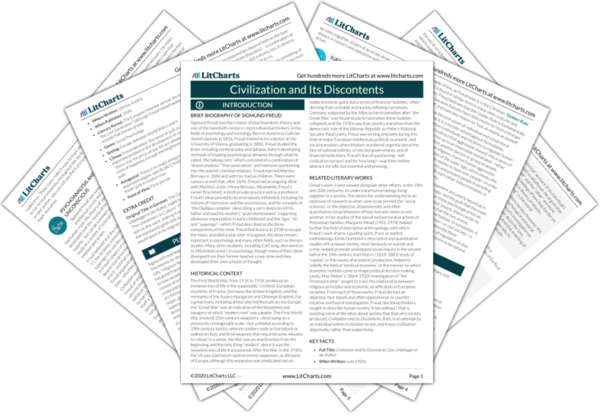Sigmund Freud was a psychologist, therapist, and intellectual concerned with the forces at work in the human mind. His theory of “psychoanalysis,” which he developed over the course of his lifetime, has many aspects—but can be summed up, primarily, as the descriptive study of a system of internal checks and balances that regulate emotion and action.
Freud believed that the mind could be divided into the ego (the “I”), the id (deep, sometimes perverse, desires) and the superego (the warden or overseer, keeping id and ego in check). In Freud’s theory of mind, humans generally are aware of the desires that drive their behaviors, but oftentimes they aren’t—and that makes these latter impulses unconscious. Freud argued that unconscious drives shape human beings’ lives—who they are and why they do what they do.
Civilization and its Discontents is a thought-experiment by Freud: an essay attempting to determine whether the same unconscious impulses that Freud saw as driving individual’s behavior could also be used to describe the formation of human civilization. Freud puzzles out whether civilization is itself a “good” or “progressive” thing: whether it makes human beings happier, healthier, and freer than an ideal “state of nature” before, or outside, civilization.
Freud concludes that the very same processes and antagonisms operating in the individual mind are the forces shaping whole civil societies. Thus Freud argues for—though he does not use the term—a “social psychology,” or a way of explaining society based on the accumulated effects of individuals’ minds.
Psychoanalysis and the Unconscious ThemeTracker

Psychoanalysis and the Unconscious Quotes in Civilization and Its Discontents
At the height of being in love the boundary between ego and object threatens to melt away.
Our present ego-feeling is, therefore, only a shrunken residue of a much more inclusive—indeed, an all-embracing—feeling which corresponded to a more intimate bond between the ego and the world around it.
The fact remains that only in the mind is such a preservation of all the earlier stages alongside of the final form possible.
The origin of the religious attitude can be traced back in clear outlines as far as the feeling of infantile helplessness.
Happiness, in the reduced sense in which we recognize it as possible, is a problem of the economics of the individual libido.
. . . we come upon a contention which is so astonishing that we must dwell upon it. This contention holds that what we call our civilization is largely responsible for our misery.
Men . . . seem to have observed that this newly-won power over space and time, this subjugation of the forces of nature, which is the fulfillment of a longing that goes back thousands of years, has not increased the amount of pleasurable satisfaction which they may expect from life and has not made them feel happier.
We recognize as cultural all activities and resources which are useful to men for making the earth serviceable to them, for protecting them against the violence of the forces of nature . . .
The tendency on the part of civilization to restrict sexual life is no less clear than its other tendency to expand the cultural unit.
Present-day civilization makes it plain that it will only permit sexual relationships on the basis of a solitary, indissoluble bond between one man and one woman, and that it does not like sexuality as a source of pleasure in its own right . . . .
The neurotic creates substitutive satisfactions for himself in his symptoms, and these either cause him suffering in themselves or become sources of suffering for him by raising difficulties in his relations with his environment . . .
The existence of the inclination to aggression, which we can detect in ourselves and justly assume to be present in others, is the factor which disturbs our relations with our neighbor and which forces civilization into such a high expenditure of energy.
Neurosis was regarded as the outcome of a struggle between the interest of self-preservation and the demands of the libido, a struggle in which the ego had been victorious but at the price of severe sufferings and renunciations.
. . . besides the instinct to preserve living substance and to join it into ever larger units, there must exist another, contrary instinct seeking to dissolve those units and to bring them back to their primeval, inorganic state.
The tension between the harsh superego and the ego that is subjected to it, is called by us the sense of guilt; it expresses itself as a need for punishment.
A threatened external unhappiness—loss of love and punishment on the part of the external authority—has been exchanged for a permanent internal unhappiness, for the tension of the sense of guilt.
. . . the price we pay for our advance in civilization is a loss of happiness through the heightening of the sense of guilt.
If the development of civilization has such a far-reaching similarity to the development of the individual . . . may we not be justified in reaching the diagnosis that, under the influence of cultural urges, some civilizations, or some epochs of civilization—possibly the whole of mankind—have become neurotic?
And now it is to be expected that the other of the two “Heavenly Powers,” eternal Eros, will make an effort to assert himself in the struggle with his equally immortal adversary [Thanatos]. But who can see with what success and with what result?











